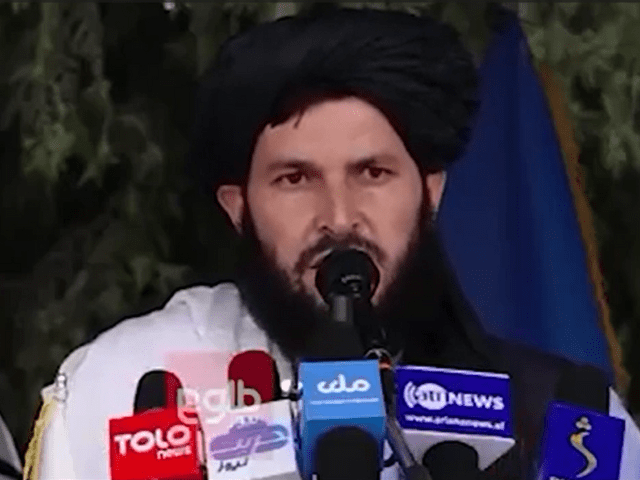Peshawar:
A Taliban superior commander said on Wednesday that activists who engage in combat in a foreign country without the authorization of Amir are not justified to do so, adding that these people cannot be considered as mujahidines or jihadists.
This was declared by Saeedullah Saeed, a principal commander at Hazrat Hamza Military Academy, during a graduation ceremony for 400 police officers in Kabul.
“Those who challenge the orders of Amirul Momineen Mullah Hibatullah Akhund and will fight beyond the borders of another country (without naming Pakistan) are not justified and disobeyed the orders of Amir,” said Saeed.
“The individuals who collapsed to one group or another to engage in jihad in a foreign country are not considered as mujahideen or jihadists,” he added.
This marks the third time that Minmineen Hibatullah Akhund has led all the followers and communicated to the commanders along the western border of Pakistan that all jihad undertaken without the decree of the Amir or the Council of Ulema is considered Fasad (illegal or corrupt).
The message came after a drone strike to Janikhel, Bannu, Khyber-Pakhtunkhwa on Tuesday, which killed more than 70 activists. Investigations after the strike revealed that more than 30 of the victims were Afghan nationals, added a source.
After the incident, Islamabad sent a severe message to Kabul, warning that if cross -border recruitment was not interrupted, the repercussions would be more serious, added the source.
Amirul Momineen’s message was transmitted to all military commanders along the Pak-Afghan border. A recent Tashkeel (a large Taliban training) was successfully thwarted, and several recruiters were arrested in the provinces of Khost, Paktika and Paktiya – known collectively under the name of Loya Paktiya or larger Paktiya, the strong property of the Haqqani network.
It was the second time that such measures had been implemented – first after the Pakistani Minister of Defense, Khawaja Asif, visited Kabul, and now after the recent visit to the Chinese and Pakistani delegations, said the source.
“In total, more than fifteen recruiters were arrested, including people who were part of Tashkeel,” added a provincial source.
According to the source, the message issued by the main commander of Hazrat Hamza Military Academy was very important in nature, directed to all those who are at the head of business.
The message occurred at a time when a tripartite meeting between Pakistan, China and Afghanistan should be held in Kabul in July.
Is China a liaison force
Haq Nawaz Khan, Senior Security Analyst and Washington Post journalist, said at the Peshawar Office of L’Express PK Press Club according to which “China is the liaison force behind tensions between Islamabad and Kabul, while regional realignment, development and success of CPEC projects are closely related to the region’s security.”
Haq Nawaz Khan explained that multiple threats rooted in Afghanistan are extending beyond TTP, including groups such as Hafiz Gul Bahadur, ISKP and the Islamic Party of Turkistan (formerly known as Islamic Movement of East Turkistan), which is known for its expertise in drone technology. He added that this group would have provided drones to the Liberation Army Baloch (Bla) and to the Balutchistan Liberation Front (BLF), whose union is also called bra. In addition, various Balouthes nationalist forces, including the Bla and the BLF, maintain links with Afghan soil.
The tip was known to provide drone technology to TTP. The BLF was also one of the recipients that Islamabad asked to be retained. TIP would also be behind the supply of laser technology and thermal engineering systems to the Liberation forces of TTP and Balutchistan, learned the Express PK Press Club.
If China did not support the unusual alliance between Islamabad and Kabul, the Qandharis would have allied with Iran and others, while the Haqqani network would have aligned with water and Saudi Arabia. However, Beijing has broken all these links for the moment, he said.
Projects for Afghanistan
The source revealed that the next rail and road initiatives include a railway connecting Hiratan to Parachinar and Kohat, which will be binding to the Karachi road in Peshawar supported by the existing Chinese.
“During the Chinese negotiations, Mullah Hibatullah asked that the railroad be also extended south of Afghanistan, connecting the provinces of Kandahar and Herat, which were considered to be part of the project,” added the source.
The existing road from Kabul-Jalalabad via Mahipar will be replaced by a highway connecting various provinces of the East, while another highway will connect Kandahar to Kabul, and a third will take place from Kabul to Mazar-E-Sharif, said the senior official.




